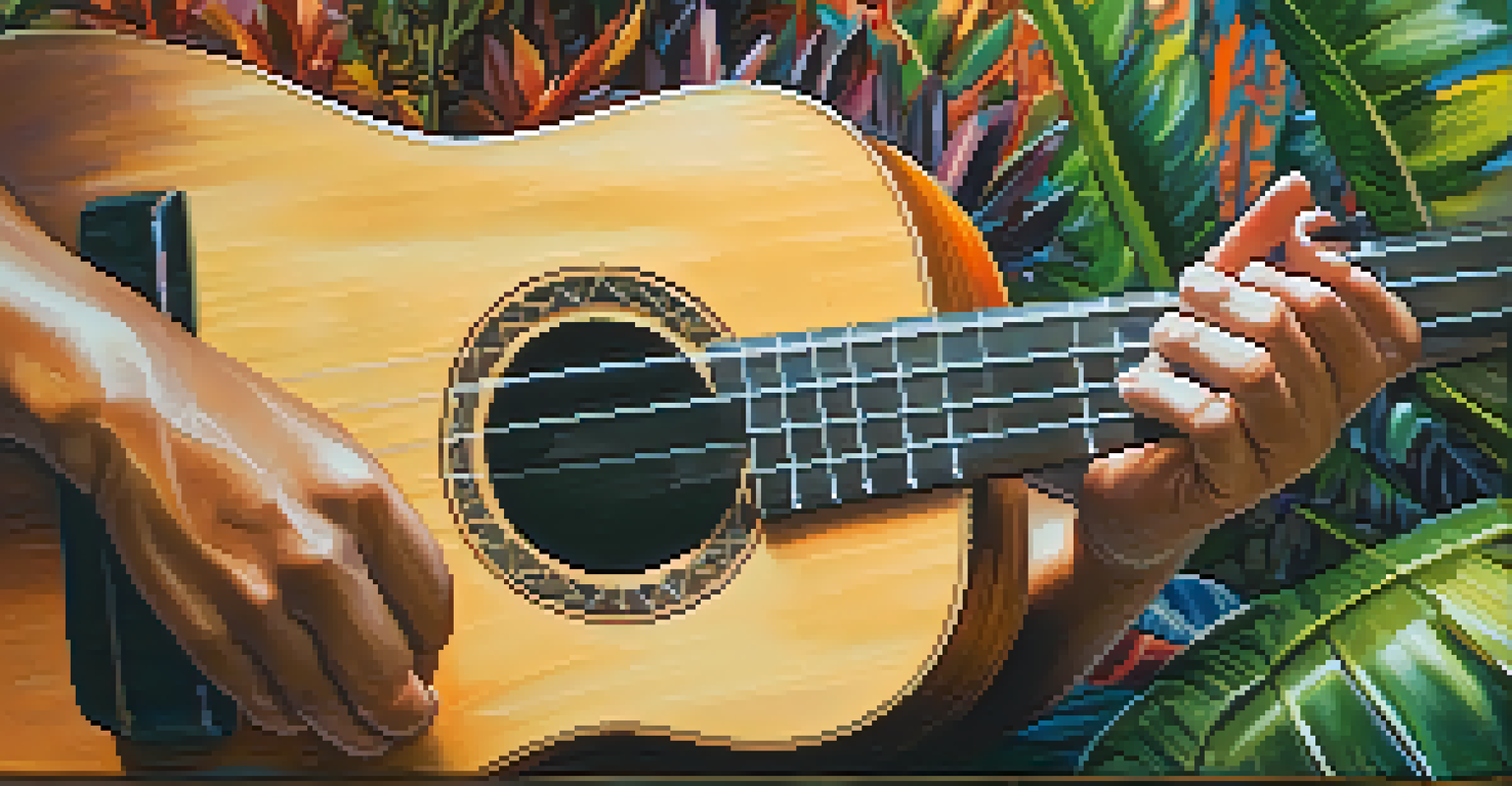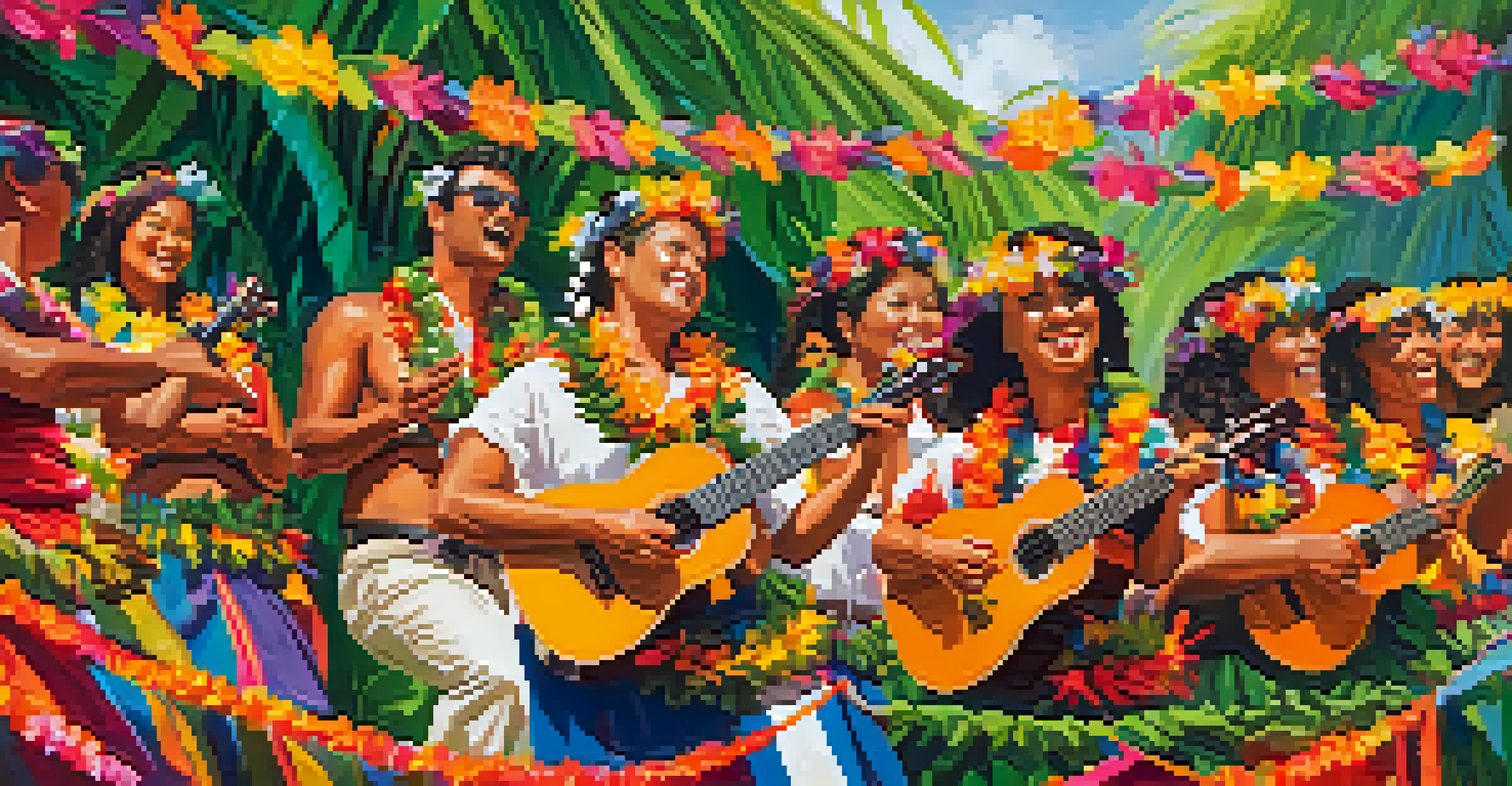The Evolution of Ukulele Music in Hawaiian Culture

Roots of the Ukulele: A Brief History
The ukulele's journey began in the late 19th century, when Portuguese immigrants brought a small string instrument called the braguinha to Hawaii. This instrument quickly captured the hearts of the locals, who adapted its design and sound to create what we now know as the ukulele. The name 'ukulele' itself translates to 'jumping flea' in Hawaiian, which refers to the finger movements when playing.
The ukulele is an instrument of joy, an instrument that brings people together.
As the ukulele gained popularity, it became intertwined with Hawaiian culture, symbolizing the islands' spirit and joy. Its cheerful sound resonated at social gatherings, bringing communities together through music. By the early 20th century, the ukulele was well on its way to becoming a staple instrument in Hawaiian music, marking the start of a vibrant musical tradition.
The ukulele's unique sound and portability made it an ideal companion for musicians, both on the beach and in homes. It served not only as a source of entertainment but also as a way to express the rich tapestry of Hawaiian life, from storytelling to celebrations.
The Ukulele in Traditional Hawaiian Music
In traditional Hawaiian music, the ukulele plays a crucial role, often accompanying hula dancers and vocalists. The instrument's light, airy tones perfectly complement the rhythmic movements and storytelling elements of hula. This synergy creates a captivating experience that showcases the beauty of both music and dance.

Songs often center around themes of nature, love, and cultural stories, reflecting the deep connection Hawaiians have with their land and heritage. The ukulele's ability to convey emotion makes it a powerful tool for preserving and sharing these narratives. Through its melodies, the ukulele becomes a voice for the islands themselves.
Ukulele's Cultural Roots in Hawaii
The ukulele, originally brought to Hawaii by Portuguese immigrants, has become a symbol of Hawaiian culture and community.
As musicians began to innovate and incorporate new styles, the ukulele adapted while maintaining its traditional roots. This blend of old and new continues to influence Hawaiian music, ensuring that the ukulele remains a vibrant part of the cultural landscape.
The Rise of the Ukulele in Popular Music
In the mid-20th century, the ukulele began to gain attention beyond Hawaii, seeping into popular music genres. Artists like Israel Kamakawiwo'ole introduced the ukulele to a global audience, showcasing its versatility in contemporary music. His rendition of 'Somewhere Over the Rainbow' became iconic, highlighting the instrument's emotional depth.
Music is the language of the spirit. It opens the secret of life bringing peace, abolishing strife.
The ukulele's rise in popularity can be attributed to its accessibility; it’s easy to learn and play, making it a favorite among beginners. This simplicity invites people of all ages to pick up the instrument, fostering a sense of community. Music schools and online tutorials have further contributed to its resurgence, inspiring a new generation of ukulele enthusiasts.
Today, the ukulele can be found in various musical styles, from folk to rock and even jazz. Its adaptability allows musicians to explore different sounds while staying true to its Hawaiian roots, bridging the gap between traditional and modern music.
Cultural Significance of the Ukulele
The ukulele is more than just an instrument; it represents a cultural identity for many Hawaiians. It embodies the spirit of aloha, emphasizing connection, love, and harmony. When played, it can evoke a sense of belonging and nostalgia, reminding individuals of their heritage and community.
In Hawaiian culture, music serves as a vital means of storytelling and preserving traditions. The ukulele facilitates this by providing a platform for sharing personal and communal stories. It plays a crucial role in cultural festivals, family gatherings, and celebrations, reinforcing bonds among generations.
Popularity in Modern Music
The ukulele's simplicity and versatility have led to its rise in contemporary music, bridging traditional Hawaiian sounds with modern genres.
Moreover, the ukulele has become a symbol of Hawaiian resilience and pride. As it continues to evolve, it remains a testament to the islands' rich history and the enduring spirit of its people, reflecting both challenges and celebrations.
The Ukulele in Contemporary Hawaiian Music
In recent years, contemporary Hawaiian musicians have embraced the ukulele while experimenting with various genres and styles. Artists like Jack Johnson and Bruno Mars incorporate the instrument into their music, showcasing its versatility and broad appeal. This fusion of sounds has helped to elevate the ukulele's status in the music world.
The blending of traditional Hawaiian elements with modern influences creates a fresh sound that resonates with both local and international audiences. This evolution reflects the dynamic nature of Hawaiian culture, which continues to adapt while honoring its roots. The ukulele serves as a bridge connecting the past to the present.
Local festivals and events often highlight these contemporary artists, allowing them to showcase their unique interpretations of Hawaiian music. This vibrant scene not only promotes the ukulele but also fosters a sense of community among musicians and fans, all celebrating their shared love for the instrument.
Teaching the Ukulele: A Growing Trend
The ukulele's rise in popularity has led to an increase in teaching resources and programs for aspiring musicians. Many schools now offer ukulele classes, recognizing its effectiveness in fostering musical interest among students. This trend not only encourages creativity but also promotes teamwork and collaboration.
Online platforms and social media have also played a significant role in spreading ukulele education. Tutorials, challenges, and virtual jam sessions make learning accessible to anyone with an internet connection. This democratization of music education allows for a diverse array of voices to emerge, enriching the musical landscape.
Growing Interest in Ukulele Education
An increase in teaching resources and community programs has made ukulele education accessible, fostering creativity and connection among aspiring musicians.
As more people learn to play the ukulele, the instrument continues to weave itself into the fabric of communities. Group play and community performances foster connections, making the ukulele a tool for building relationships and sharing joy.
The Future of Ukulele Music in Hawaiian Culture
Looking ahead, the future of ukulele music in Hawaiian culture appears bright. As new artists emerge and traditional musicians innovate, the ukulele will likely continue to evolve while staying connected to its roots. This ongoing transformation ensures that the instrument remains relevant and cherished in modern society.
The fusion of styles and genres will likely lead to exciting collaborations and new musical expressions. As technology advances, musicians may explore innovative ways to incorporate the ukulele into their work, pushing creative boundaries. This evolution will not only enrich the music itself but also inspire future generations of musicians.

Ultimately, the ukulele will continue to serve as a symbol of Hawaiian culture, reflecting the islands' resilience and the spirit of aloha. As long as the instrument is played, it will carry the stories, emotions, and traditions of Hawaii into the future.